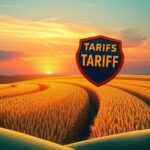America’s Energy Future: Breaking Free from China’s Influence
The United States is facing an energy crossroads, with current policies undermining sovereignty and competitiveness. The push for electric vehicles has increased reliance on foreign supply chains, particularly from China. To reclaim energy independence, investment in advanced battery technologies and partnerships with allied manufacturers is essential. Immediate action is required to secure America’s energy future and bolster national security.
As the United States navigates the challenges of technological advancement and rising energy demands, the importance of a dependable energy supply has reached unprecedented levels. A comprehensive energy strategy that harmonizes renewable resources with fossil fuels is essential for achieving energy dominance, particularly as the nation seeks to fuel the burgeoning Artificial Intelligence sector. However, current policies under the Biden administration are seen as detrimental, potentially compromising national sovereignty, security, and economic competitiveness.
The administration’s strong push for electric vehicles has negatively impacted the U.S. auto industry, compelling companies to rely on foreign supply chains, notably involving China, thus inhibiting domestic industry progress. China’s control over the battery market is a direct consequence of these policies, necessitating a concerted effort to reinstate U.S. energy independence through investment in advanced battery technologies and the establishment of a secure supply chain devoid of Chinese influence.
Companies such as CATL, recognized as the largest lithium-ion battery manufacturer globally, exemplify China’s objectives to dominate the electric vehicle and battery industries, raising significant national security concerns due to their affiliations with the Chinese Communist Party. Despite the risks, 35% of CATL’s energy storage batteries have been purchased by U.S. customers, resulting in no job creation in America.
Granting entities like CATL access to the American market permits the CCP a troubling foothold in a vital energy supply chain that will be crucial for supporting the AI boom. There is an urgent need to examine the ownership structures of foreign battery manufacturers to safeguard U.S. national security interests and ensure compatibility with them.
The landscape, however, offers promising alternatives. Leading firms from Korea and Japan, including AESC, LG, SK, Panasonic, and Samsung, provide superior technologies that are produced in allied nations. These companies have proactively engaged with the Committee on Foreign Investment in the U.S. (CFIUS) to mitigate potential security risks, while simultaneously fostering domestic job creation.
For instance, AESC’s commitment to invest $6 billion will create 6,000 high-paying jobs in the U.S., contributing positively to the economy while enhancing national security. Meanwhile, American firms are moving away from CATL-produced projects amid concerns over collaboration with CCP-affiliated entities.
The U.S. government possesses the capability to expedite the transition toward secure, non-CCP-aligned battery technologies. Existing Biden-era regulations designed to limit support for CCP-affiliated companies are plagued by loopholes that necessitate revision. It is paramount that U.S. investments and contracts avoid associations with Chinese companies exhibiting strong military ties.
By prioritizing support for companies like AESC, LG, SK, Panasonic, and Samsung, the United States can cultivate a robust battery manufacturing ecosystem that eschews Chinese military influence, thereby securing energy independence and affirming its standing as a leader in national security and technological innovation. The imperative to act is pressing, as the future of America’s energy independence and national security is at stake.
In summary, America’s energy future faces challenges due to current policies that risk national sovereignty and economic competitiveness. Reclaiming energy independence necessitates investments in advanced, secure battery technologies from allies rather than adversaries. The emphasis on fostering relationships with reputable battery manufacturers can bolster domestic job creation, enhance national security, and ensure the United States remains a global leader. Prompt action is critical to protect America’s energy future.
Original Source: www.foxnews.com







Post Comment